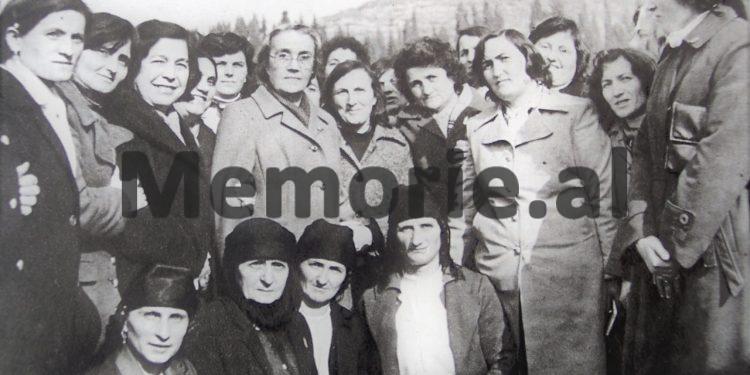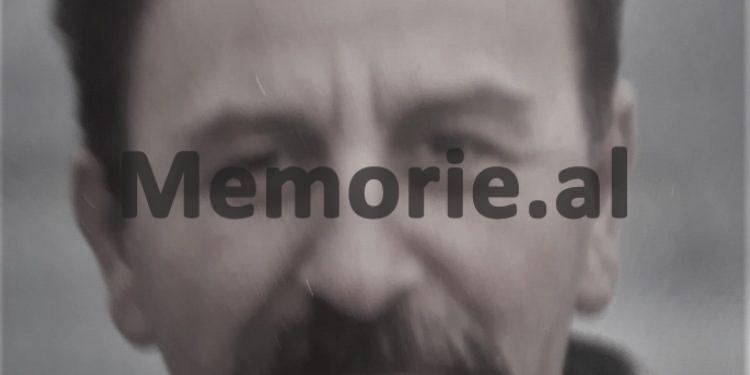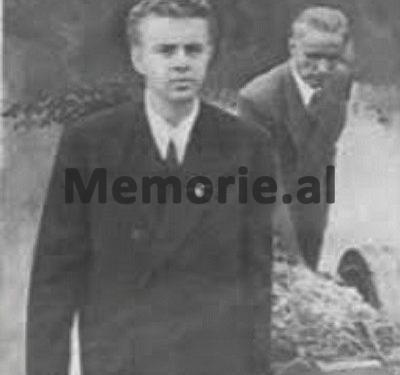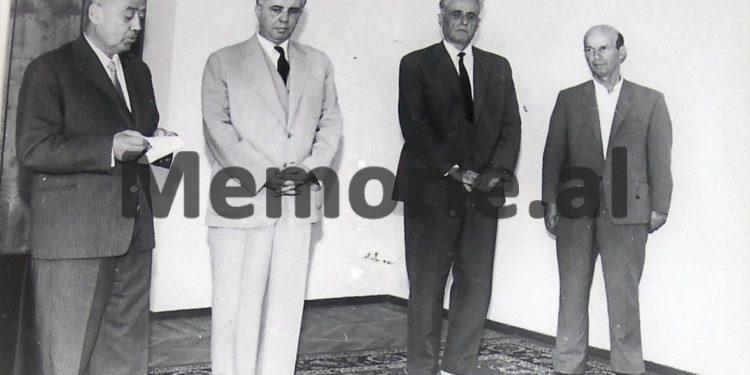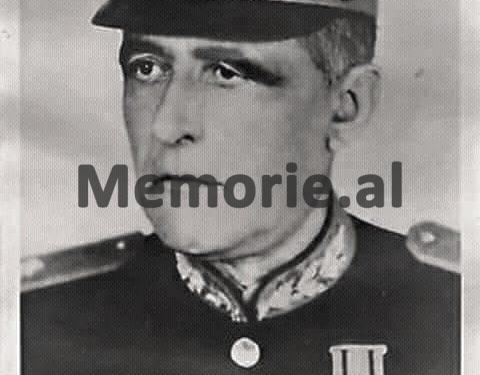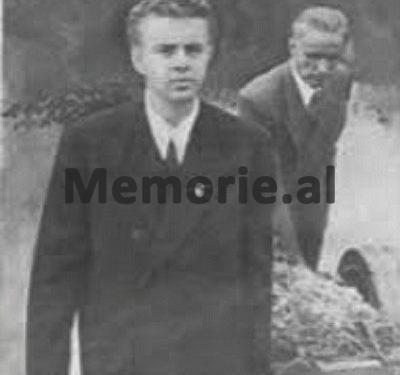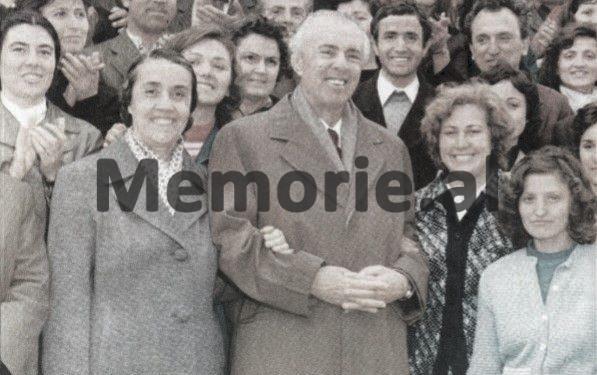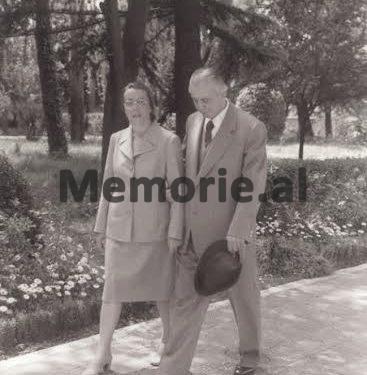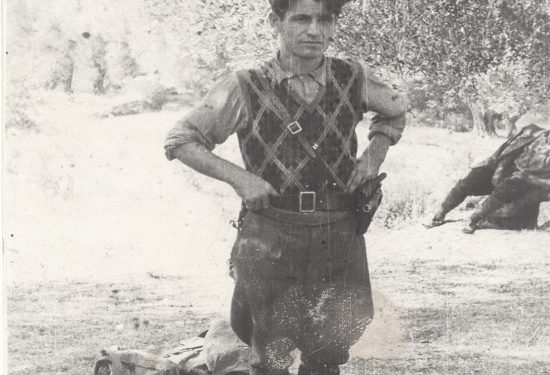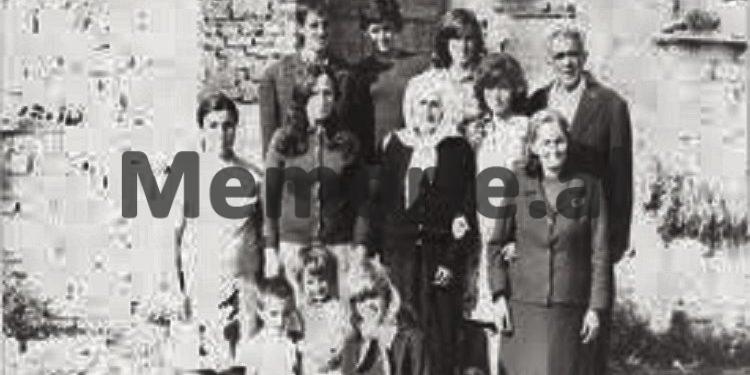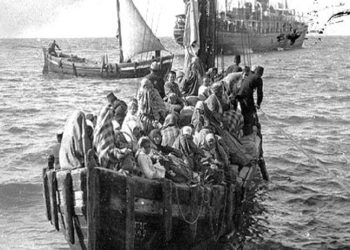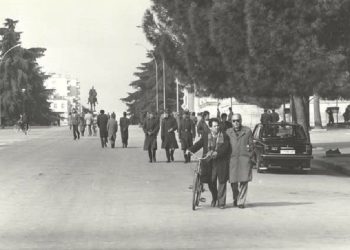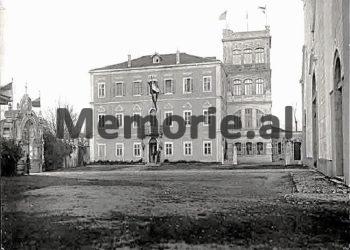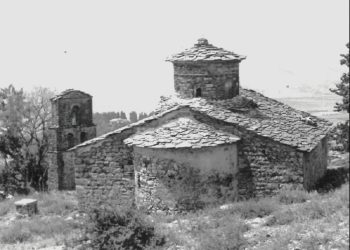By Bashkim Trenova
Part thirty-nine
Memorie.al publishes the memoirs of the well-known journalist, publicist, translator, researcher, writer, playwright and diplomat, Bashkim Trenova, who after graduating from the Faculty of History and Philology of the State University of Tirana, in 1966 was appointed a journalist at Radio- Tirana in its Foreign Directorate, where he worked until 1975, when he was appointed journalist and head of the foreign editorial office of the newspaper ‘Zeri i Popullit’, a body of the Central Committee of the ALP. In the years 1984-1990, he served as chairman of the Publishing Branch in the General Directorate of State Archives and after the first free elections in Albania, in March 1991, he was appointed to the newspaper ‘Rilindja Demokratike’, initially as deputy / editor-in-chief and then its editor-in-chief, until 1994, when he was appointed to the Ministry of Foreign Affairs with the position of Press Director and spokesperson of that ministry. In 1997, Trenova was appointed Ambassador of Albania to the Kingdom of Belgium and to the Grand Duchy of Luxembourg. Unknown memories of Mr. Trenova, starting from the war period, his childhood, college years, professional career as a journalist and researcher at Radio Tirana, the newspaper ‘Zeri i Popullit’ and the Central State Archive, where he served until the fall of the communist regime of Enver Hoxha, a period of time when he in different circumstances met many of his colleagues, suckers of some of the ‘reactionary families’, etc., whom he described with a rare skill in a book of memoirs published in 2012, entitled ‘Enemies of the people’ and now brings them to the readers of Memorie.al
Continued from the previous issue
WITH “HEROES OF THE PEOPLE”
POLITICAL BUREAU AND THE PRESIDENCY
It is known that Kajo was killed in Lis Patros of Kavaja in an attempt with the Germans. He, as Myslym’s eldest son, Skënder Peza, told me, said that “I will not come out of this war alive”! And did not come out alive. He fell heroically left alone in the game with the enemies. Friends were withdrawn. He refused to back down. Thus fell in this battle one against all. In “November” it turned out that the commissioner, Sali Verdha, was by his side until the last moment, fighting heroically. That is why Baba repeated like a refrain: “Lie or Baba, lie”!
The comrades returned without Peja to Peza. One of them had Kajo’s leather jacket with him, which my father took and then used. I also have some photos of him of the time with Kajos jacket. When they approached the house of Shyqyri Peza, as Myslym’s mother and eldest daughter, Dije Peza, told me, Myrvetja looks at them and asks: “Yes Kajo, where is Kajo” ?! They do not answer, they are silent. Myrvetja realized the tragedy and went and locked herself alone in a room of the house. Even his friends left him alone. After a while machine-gun shots are heard from the room. Myrvetja had judged life in vain while she had lost her love. You can tell another story “Romeo and Juliet”.
Myslym Peza and his brother, Shyqyri, were one and inseparable, Enver tried to separate them!
In my estimation, Shyqyri and Myslim Peza are historical figures of Central Albania. They were inseparable and no one could separate them. Only Enver Hoxha once tried to do this with his people. Today, the self-proclaimed democrats and anti-Enverists want, apparently, to finish what left Enver Hoxha unfinished, to de-heroize the heroes, to throw their monuments where the garbage of the city is thrown.
I have known Myslym Peza as an honest and just man, as a man who liked to call him black and white and white and white. With such a character he helped and rescued many people from prisons and executions ordered by communist courts to those who were branded “war criminals”. This is what happened, for example, to Ibrahim Bicaku. He had been prime minister for a month during the fascist occupation of Albania. This cost him dearly, but it would have cost him even more, if Myslym Peza, who was then Deputy Prime Minister, had not testified in his favor. Ibrahim is the only prime minister, from what has been called a quisling in all of Eastern Europe, who has not been shot. This came after in his trial, as a witness, Myslym Peza stated that during the war when Ibrahim Bicaku was prime minister, he had sent him two trucks with weapons, food and clothing for Peza’s partisans.
Myslym Peza defended Haki Mulleti, after his brother, Qazimi, had opened the mortuary when Shyqëriu was killed!
The case of Haki Mulleti, the brother of Qazim Mulleti, the prefect of Tirana at the time of the fascist occupation, is similar. In 1945, Haki was held for a time under investigation and later sentenced to four years in prison. Along with Haki, 18 other people appeared in court, all of whom were sentenced to be shot. Haki’s son, Tanushi, in an interview he gave to the Albanian press after the overthrow of communism said: “Only the father escaped after helping Myslym Peza, who went to court as a witness. Myslim Peza defended Haki, as his brother Shyqëri Peza, our family had a house friend and when he died, Qazim Mulleti opened the mortuary. “Also during the war, Myslim himself took refuge in our house and because of him the Italians wanted to burn down our house.”
With these and other such attitudes of Myslym Peza, surely Enver Hoxha, the strategist of fratricide and the executioner of the class war, the conductor of the red orchestra of the communist genocide, did not agree. He, as is well known, after coming to power ordered the assassination of his brother-in-law, Bahri Omari, to whom he had taken refuge during the years of occupation. Enver, it seems, has not forgotten Myslym the statements before the court, which eliminated from the black list the names of certain Albanians to be sacrificed in his demonic temple. This is evidenced, in my opinion, by his secret diary in which you can clearly read what Enver Hoxha was knitting at the end of his life and that of Myslym. He could not die without leaving the Party completely clean! This means that he could not be separated from this life without eliminating Myslim Peza and Haxhi Lleshi, as he had done with all his closest comrades-in-arms, after accusing them of being agents and poli agents, as traitors, conspirators. coup plotters, as hostile and saboteurs!
Myslym died and so did Enver “projects”. Enver shed tears for him. Indeed, no one saw her shed tears. He himself said that he had cried, even that he had cried twice, on the day of Myslym Peza’s funeral and when he had read a report that Frrok Çupi had published in those days in “Zeri i Popullit” about Myslym Peza!
Attempts to tarnish the image of Myslym Peza even after the ’90s
Having spent whole months, during my childhood years in Myslym Peza’s house, I certainly somehow know his private life as well. I do not want to get into a story or analysis of it. I think it belongs to him and only him and his family. During the years of democracy, what has been said and what has not been said about Myslym Peza. They treated him unworthily, simply because his son, Dashi, is a Socialist Party MP. They have tried to tarnish him, simply because they want to overthrow Aries, as a political opponent. Surely, if Dashi were to retire to his quiet life in Peza, no one would remember to say a bad word about Myslym Peza. If Dashi did not open the doors of the house for the chairman of the Socialist Party, Edvin Rama, the main opponent of Sali Berisha, prime minister and chairman of the Democratic Party, no one would even deal with Dashi himself.
Dashi lives today in Myslym’s house in the village of Peza, as her only heir. In fact Myslymi also has other heirs from his first marriage. Aries was born from Myslym’s second marriage. He also has a sister, Ada, an unfortunate wise and beautiful woman, also born from this marriage. Ada has been accepted as a sister or half-sister by Dija, Skënderi and Partizani. She even went in and out of their house. The same thing did not happen to Aries. He has not been accepted as a brother or half-brother and has never stepped on their doorstep.
At the house of Myslym Peza, on the day of his burial, the ‘People’s Hero’, Haxhi Lleshi, Myslym’s old friend, had also come for consolation. I had known him since my childhood. My father, as I was told, had a close tribal or kinship relationship with his family. Haxhiu, during all the years he was in power, as far as I remember, came to our house only once. When my dear grandmother, Shyqyria, or as she was briefly called, Çerka, died, he came for consolation. On other occasions I met him at Myslym’s house. In Myslym’s waiting room there was also a table on which, almost always, stood a basket of oranges. Haxhiu reached out, took a grain and threw it at me. There were not many words. He was a calm man. He even laughed sparingly.
Haxhi Lleshi and Medar Shtylla could not help me to go to the Faculty of History-Philology!
Many years later, after graduating from high school, I was granted the right to study Forest Engineering. I wanted to go on to History-Geography. My mother asked Haxhi Lleshi, whom she had met on an anniversary of the Peza Conference, to help me gain the right to study in the branch I wanted. Haxhiu told her that I should go the next day and meet her at the Headquarters of the Presidium of the People’s Assembly, which at that time was where the Academy of Sciences is today. I went to the Presidium of the People’s Assembly the next day. Instead of Hajji, I was received by Et’hem Berhami, originally from Mati. I did not know then, nor did I later find out, what function it had in the People’s Assembly. Quite politely, he asked me to talk to him. I had the conversation with him and in the end I came out as I entered, was conveyed as received with courtesy and a parental smile. Apparently he had this message from Haxhi Lleshi, the chairman of the Presidium of the People’s Assembly!
In fact, something similar was repeated with Medar Shtylla, at that time vice-president of the Presidium of the People’s Assembly and dean of the Faculty of Medicine. It was Myslym Peza who asked him to see the possibility of making it possible for me to study at the Faculty of History and Philology. I was present when this conversation took place. “Come meet me tomorrow at the University building,” Medar Shtylla told me. I went and met him, just as he had told me. “Come meet me after two days at the Faculty of Medicine,” he told me, laughing politely, as did Et’hem Berhami. I went even after two days. I was forwarded the same as before. Neither Haxhi Lleshi, the chairman of the Presidium, nor Medar Shtylla, the vice-chairman of the Presidium, did anything. I lost a year of my studies, waiting to be helped by them. At least they did not make me a communist moral; they did not tell me that the Party and the Homeland needed forest engineers, so I had to respond to that need.
I met Haxhi Lleshi again after about 15 years quite by chance. I was working at the time for the Voice of the People. Together with some fellow journalists, we had a coffee with him at Hotel Tirana. I do not remember the conversations we had and why we were together at a table. I remember at one point he turned to me and told me that my family did not have the surname Trenova, that she had changed her surname to hide. It was the first time I heard this explanation. I knew I had an honest family, who had no reason to hide, changing identities. Even our cousins across the border, in Dibra e Madhe, had the same surname as me and my uncles in Tirana. So even if the former surname had been changed, it belonged to several previous generations, whom I had neither ever known nor heard of being spoken of. I do not rule out the possibility that my ancestors were in blood or enmity and that the surname was changed to avoid a possible blood feud, to end a blood feud that could take generations.
I had another meeting with Haxhi Lleshi after I left “Zeri i Popullit”. I have mentioned it before that the State Archive, when I had just started working in this institution, opened in one of the halls of the Palace of Culture of Tirana an exhibition with documents from the Anti-Fascist National Liberation War. I became her guide. Haxhi Lleshi was one of the guests of honor who participated in its opening. I do not remember anything special from this meeting. At this time he was no longer chairman of the Presidium of the People’s Assembly.
When Myslym Peza died, Haxhi Lleshi refused to meet with Enver!
The last time I met Haxhi Lleshi, as I said, was at the house of Myslym Peza, in February 1984. The house was full of people, friends and comrades of Myslym, who had come to say goodbye to him last. Haxhiu was not in the waiting room. He had come downstairs to the kitchen. He was sitting in a chair, completely alone. It seemed like he didn’t want to meet anyone. I stood by him for some time. At one point, my sister, the Angel, arrives in the kitchen. She tells me to go upstairs, because Enver Hoxha had come. I left Haxhiu. He did not play from the place. “Go, go, he told me, I will come a little later.” In fact, during the whole time that Enver Hoxha stayed in Myslym’s house, Haxhiu sat down there in the kitchen of the house, almost alone. Was he the one who did not want to meet Enver Hoxha, or was it Enver Hoxha who did not want to meet him and Haxhiu knew this ?!
Haxhi Lleshi was an active participant and one of the main leaders of the Anti-Fascist National Liberation War. After the liberation of the country, he held the post of Minister of Interior for about two years in the cabinet of Enver Hoxha. From 1953 to 1982, he held the post of chairman of the Presidium of the People’s Assembly. The elections of November 14, 1982 for the People’s Assembly brought Ramiz Alia at the head of the Presidium of the People’s Assembly. Haxhi Lleshi saw himself out after 29 years in this post. In the news broadcast by the Albanian television on this occasion, I remember the filming of Haxhi Lleshi sitting in the hall, rhythmically clapping his hand on the table in front of him with the same nervousness. Didn’t Haxhi Lleshi want to meet with Enver Hoxha, because he thought that he had unjustly removed him?!
In the incident of the bombing of the Soviet embassy, the two brothers of Haxhi Lleshi’s wife were also shot!
From an interview that Haxhi Lleshi gave shortly before his death, it turns out that he was actually dissatisfied, but not with Enver Hoxha. According to him, Enver Hoxha, especially in the last years of his life, no longer ruled the country. He was influenced by his wife Nexhmija and by the one who took the place of Haxhiu, who would also become the successor of the dictator, Ramiz Alia. It is these, according to Haxhiu, who removed him, removed him against his will.
Throughout his life, Haxhiu has shown himself to be loyal among the most loyal to Enver Hoxha. The dictator has not ceased to strike him and he has not ceased to declare his complete loyalty and admiration for the dictator. His family received the first, severe and irreparable blow in the shocking days of February 1951, when an explosive device exploded at the Soviet Embassy in Tirana. In response, the regime, based on three pre-prepared lists, on February 20, 21 and 22, in three waves of repression, arrested 102 people. Twenty-two of them were shot. Among those shot are two Jegeni brothers. Myftari 36 years old and Gafuri 43 years old. They were brothers of Haxhire, the wife of Haxhi Lleshi. Both families of those shot were interned. As the original published documents prove, the bombing of the Soviet Embassy was simply an act of the State Security, to then justify the arrests, killings and imprisonments of completely innocent people. Haxhi Lleshi, even in this case, agreed, without any reservations, with the Party and Comrade Enver. He will also admit to the innocent murder of his in-laws and not only that.
Enver proposed to Haxhi Lleshi to deport his son, Reshit!
In 1976, Haxhi Lleshi would agree with the decision to deport his son, Reshit, to the village of Mollas in Elbasan. I met Reshit in 1994 at the Ministry of Foreign Affairs. I had heard of it before. Thimi Çollaku, a colleague of mine at Radio Tirana, had told me about Reshit. They had both completed diplomacy studies in the Soviet Union.
I knew Reshit as Thimi had described to me. He was an open, simple and honest man. He had realized that his father, Haxhi Lleshi, was a doll in the hands of Enver Hoxha. Reshit had openly told his father what he thought of him. The father reported his son to Enver Hoxha. Reshit was also summoned to the Central Committee of the Party, to “advise” him. He was asked to give up such thoughts as the one he had expressed about his father. Reshit insisted on his opinion. This was also the reason why he was interned. It is Enver Hoxha himself who, as he wrote in his secret diary already published, proposed to Haxhi Lleshi to deport Reshit. As Enver Hoxha writes, Haxhiu’s answer was: “What does the Party mean”!
According to Enver Hoxha’s diary, Reshiti was interned because he accused his father of “betrayal”. Enver does not explain who was betrayed, who Haxhiu had betrayed. This is passed by Enver in this way, not without purpose. “Betrayal” in the years of dictatorship meant betrayal of Enver Hoxha or, similarly, betrayal of the Fatherland, the Party and Socialism. Enver was the Party, the Homeland and Socialism! In such a case, Enver had to punish Haxhi Lleshi and decorate Reshit. If the opposite happened, it means that Enver manipulates even in this case, as always, when he gives his version of the truth. Reshit was convicted because he called his father as he was, an Enver doll. Haxhiu continued to remain in the post of chairman of the Presidium of the People’s Assembly, not because he had “betrayed”, but because he was loyal to Enver.
Enver’s deceptions in his diary regarding the “betrayal” of Haxhi Lleshi and his son, Reshit!
Enver’s diary has a much later date than Reshit’s exile, so it is not a diary, but a delayed narration or interpretation of events in other circumstances. When it was written, Enver needed Haxhiu a “traitor”, or similarly, an “agent”, even to present him as such through his son. I talked to Reshit, in a case when after the overthrow of the dictatorship, in the right-wing press, it was written about Haxhi Lleshi as an agent of the Yugoslavs. He was quite touched. “You know,” he told me, “what attitude I had towards my father. An agent of the Yugoslavs, no, he has never been”! This statement of Reshit proves, at least, that he did not accuse his father of “betrayal”!
Enver Hoxha writes according to his appetites in the secret diary also about Haxhiu’s wife, Reshit’s mother, Haxhirena. I have had the opportunity to meet Haxhirena once or twice. She was a smiling woman who wanted to talk without much fuss. Haxhire was different from most of the women of the communist high dome who were held as “proletarian” ladies. After Reshit was interned, she left home and went to Mollas next to her son. She left never to return to her former life partner. Haxhireja died, left forever of all her loved ones, there in Mollas on October 17, 1985.
Enver, like those bad old women, slanders Haxhirena “from the Bajraktars of Dibra” and from a family that “has political fugitives in Tito’s Yugoslavia”. According to Enver Hoxha, Haxhireja was making a scandal, accusing the chairman of the Presidium of the People’s Assembly, Haxhi Lleshi, of being “immoral”. Later he himself will accuse Haxhi Lleshi as such. At that time, as he writes in his secret diary, he proposed to Haxhiu to deport Haxhirena to Mollas to his son, in order to silence her as well. Haxhiu’s answer even in this case, as Enver Hoxha writes, was: “How the Party wants”!
Why did Enver Hoxha change his attitude towards Haxhi Lleshi? Why did Haxhi Lleshi not come to meet Enver Hoxha at Myslym Peza’s house? Enver Hoxha did not forgive only for one thing, he did not forgive any I said, no dream, no lie that, in one way or another, would question his power as well as that of his successor chosen by him. Despite the fact that Haxhiu had proved his loyalty even by abandoning his wife and son in the ruthless fate assigned to them by the dictator, he would not forgive him, that at the moment some anonymous letters or his paranoid dreams would whisper to him that Haxhiu was thinks to take his place after death! This thing is clearly revealed in his secret diary.
Among other things, Enver writes in the diary: “From the heavy sleep where he had fallen after the suicide of the enemy Mehmet Shehu, Haxhiu also woke up. The woman D.SH., with a good biography, clerk in the Presidium of the People’s Assembly, has become Haxhiu’s secretary, but he has also thrown this in bed, as it is said among the clerks of the Presidium, who are writing to the Central Committee. ..But the bad thing about the bad is that … she has turned into a provocateur without limits, speaks ill of the main leadership of the Party and goes so far as to tell a communist friend, who works in the apparatus of the Presidium, that … “when Enver Hoxha dies, Haxhi Lleshi will take power”. It is clear that these dangerous actions are the conversations that Haxhi Lleshi makes to her in bed, to which the least we can say is that Haxhi the old man, love has entered his head and “what is in his stomach, the white man pulls out “.
This is why now Haxhi Lleshi is both immoral and suspected of being an agent as well as Myslym Peza. That is why he will be removed from the post of chairman of the Presidium of the People’s Assembly. It is clear that it is not Haxhi Lleshi who did not want to meet Enver Hoxha at Myslym Peza’s house. It was the dictator who no longer wanted to see him near him. It was he who was preparing to crush the new hostile group against the Party and the Fatherland, led by Myslym Peza and Haxhi Lleshi, the last of the leaders of the Anti-Fascist National Liberation War, who had so far escaped his blow.
Despite everything, Haxhi Lleshi will continue until the end in the role of a dog, loyal to his master even when he kicks him, even when he hits him to death, despises him and drives him away. “I am much honored to have been one of Enver Hoxha’s collaborators in the war and after it,” Haxhi Lleshi will write in his memoirs. For him, Albania, during its history, has produced two great leaders, Skanderbeg and Enver Hoxha. “Skanderbeg,” he writes in his memoirs, was the horror of an empire; “Enver Hoxha was the horror of many empires and, as far as we were concerned, no enemy could put Albania on the ground.” The truth is that he, in the post of chairman of the Presidium of the People’s Assembly for about 30 years, has thrown in the trash the prayers of thousands and thousands of death row inmates, to spare their lives.
He has signed or raised his hand that thousands of Albanians go to the bullet, that thousands of Albanian families are left without their loved ones, that thousands of children are discriminated against all their lives and do not feel parental love. That is why he collaborated with Enver Hoxha after the war. On the other hand, if Skanderbeg faced a foreign empire, Enver Hoxha, with imperial dreams and illusions, destroyed and threatened to physically destroy, with the weapons of violence and misery, his own people and country. To boast that you collaborated with Enver Hoxha, means to boast that you were an accomplice in the crime./Memorie.al
The next issue follows




